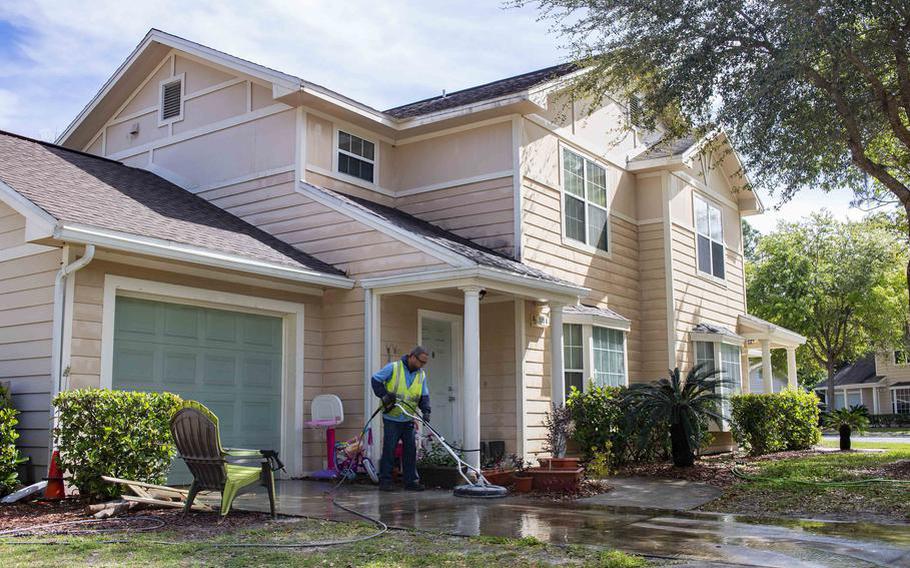
A maintenance worker in 2019 for Balfour Beatty Communities, a private company that manages military housing, power washes the driveway of a home at Marsh Cove, a military residential community at Naval Station Mayport, Fla. (Nathan T. Beard/U.S. Navy)
WASHINGTON — The Defense Department launched a website Monday to track problems with military housing managed by private companies following years of relaxed oversight that led to rodent and pest infestations, exposure to lead paint, and mold growth.
“The Department of Defense has a moral obligation to ensure that the spaces where our service members and their families live are healthy, functional, and resilient,” said Deborah Rosenblum, acting deputy undersecretary of defense for acquisition and sustainment.
The housing feedback system allows active-duty service members and dependents living in privatized military housing to submit feedback on the condition of their current lease. After it is approved by the military housing office and identifying information is removed, the feedback will be made public on the website, acting as an online database of reviews.
“This new feedback system is a critical step to ensuring transparent and timely responses to occupants’ concerns and aligns with [Defense Secretary Lloyd Austin’s] priority to take care of our people. We are focused on putting our people’s experiences at the very center of all the work we do,” Rosenblum said in a prepared statement.
Problems with privatized housing came to the forefront after a 2019 investigation by Reuters showed the squalid conditions that many military families lived in. Congress approved sweeping overhaul measures in response, including a tenant bill of rights that gave residents more leverage with their landlords and a formal process for residents to dispute inadequate resolutions.
But a Government Accountability Office report in 2023 found a lack of management of military housing and an inconsistent standard of living conditions across the services. Earlier this year, the Pentagon also drew harsh criticism from lawmakers after some budget requests for the service branches included cuts to housing projects.
“This isn’t just a money, pay, [and] salary issue, it’s quality of life at the base and in the barracks,” Rep. Mike Garcia, R-Calif., a former Navy officer, said during an April hearing of the House Appropriations Committee’s defense subpanel. “Having to live in squalor when your civilian counterparts aren’t.”
The Defense Department’s announcement Monday touted the system as “a critical step” to address residents’ concerns in a timely manner.
Heather Hall, president of the nonprofit advocacy group Military Housing Coalition, offered an example of a situation that some military families living in base housing face: A leaky roof displaces them while the ceiling of their home is ripped out and replaced. Three months later, the leak returns.
“Why wasn’t it fixed properly?” she asked.
“On top of worrying about all the things normal families worry about – doctor appointments and school – they have to also prepare for a deployment or a [permanent change of station] and fight to get repairs done to their house,” Hall said.
Her hope, she said, is the housing feedback system will alleviate the lack of oversight of military housing offices and lead to maintenance and repair requests being taken care of sooner and properly.
Typically, service members or their families have to reach out to their local military housing office when they need to report on ongoing and unresolved maintenance issue. The website, Hall said, will help the service member voice the issue directly to the Defense Department.
“If you, as the resident, are posting to this big forum, the hope is that the people who need to see it are going to see it,” she said. “As long as it is being taken seriously and is addressed properly.”
The housing feedback system can be accessed at https://www.dhfs.mil/rfs.
The homepage of the site includes resources where members and dependents can submit a maintenance work order for repair directly with the landlord’s property management office. They can also initiate the dispute resolution process if unsatisfied with their work order experience, find a copy of the privatized housing tenant bill of rights, and locate contact information for the military housing office and privatized landlord or their property manager.
Before submitting feedback, individuals must confirm they are an active-duty service member or dependent and they live in privatized military housing.
The database of feedback, which was empty as of Monday, is available for the public to view. When searching the database, the public can filter feedback based on service branch, installation, landlord and categorized conditions impacting a residence. The list of conditions touches every corner of a residence, including reports of asbestos, mold, pests, and problems with appliances, the roof or ceiling, flooring, plumbing, and electric.
Landlords can also respond to feedback, with their response being published after being reviewed by the housing office.
The housing feedback system will not replace existing processes for submitting maintenance work order requests. Privatized military housing residents should continue to submit work order requests through their community’s property manager.
Now that the website is up and running, Hall said the real work begins – ensuring service members and their families know about the new resource.
Once feedback begins making its way onto the database, Hall suspects patterns will become evident – multiple residents at once installation reporting similar problems. That is when accountability will come into play, she said.
“Sometimes (Interactive Customer Evaluation) complaints are bumped back to the housing provider to address it and nothing ever comes from it,” Hall said. “If this ends up being the same thing, it won’t be worth anything and will be a waste of time.”